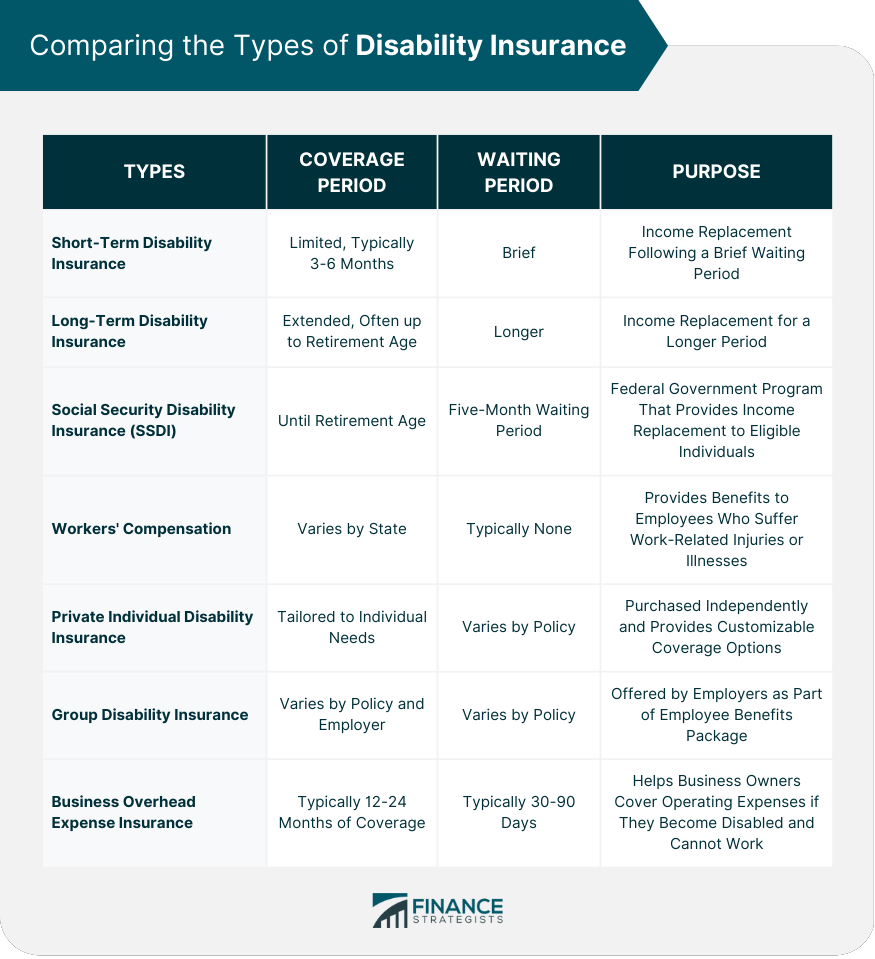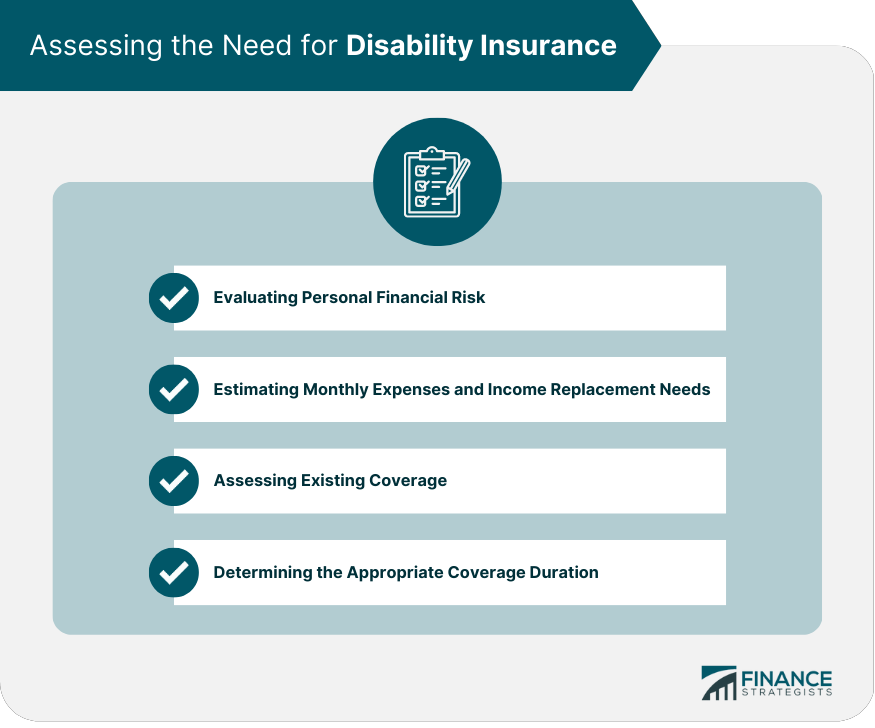Disability insurance planning is the process of evaluating your potential risks and financial needs in the event that you become unable to work due to a disability, and then determining the type and amount of disability insurance coverage that would best meet those needs. Disability insurance can help replace a portion of your income, cover medical expenses, and provide financial security in the event of a disability. Disability insurance planning involves assessing your current financial situation, determining how much coverage you need, and selecting the right type of disability insurance policy to protect you and your loved ones. Short-term disability insurance provides income replacement for a limited period, typically three to six months, following a brief waiting period. Long-term disability insurance offers income replacement for an extended period, often up to retirement age, with a longer waiting period than short-term disability insurance. SSDI is a federal government program that provides income replacement to eligible individuals who have become disabled and can no longer work. Workers' compensation is a state-mandated insurance program that provides benefits to employees who suffer work-related injuries or illnesses. Private individual disability insurance policies are purchased independently and provide customizable coverage options based on individual needs. Group disability insurance is offered by employers as part of their employee benefits package, providing coverage at a lower cost than individual policies. Business overhead expense insurance helps business owners cover operating expenses if they become disabled and are unable to work. Consider your financial obligations, such as mortgage payments, student loans, and living expenses, to determine the potential impact of a disability on your financial stability. Calculate your monthly expenses and the amount of income replacement needed to maintain your current lifestyle in the event of a disability. Review any existing disability insurance coverage, including group plans and government programs, to determine if additional coverage is necessary. Consider factors such as your age, health, occupation, and financial goals when determining the desired duration of disability insurance coverage. The elimination period is the waiting period before benefits begin, ranging from 30 days to several months. The benefit period is the length of time during which disability benefits are paid, which can range from a few years to retirement age. Disability definitions vary among policies and can include total disability, partial disability, or occupation-specific disability. These benefits provide income replacement for individuals who can work but have a reduced capacity due to a disability. COLAs are optional policy features that adjust benefits to account for inflation over time. Future increase options allow policyholders to increase their coverage without undergoing additional medical underwriting. Non-cancelable policies guarantee that premiums will not increase, while guaranteed renewable policies ensure that coverage cannot be canceled as long as premiums are paid. When shopping for disability insurance, it's important to compare various insurance carriers based on factors such as their financial strength, industry reputation, and customer service quality. By selecting a reliable and reputable insurance company, you can ensure that your policy will be there when you need it most. Select an insurance agent or broker who specializes in disability insurance and demonstrates a commitment to finding the best policy to suit your specific needs. An experienced agent or broker can help you navigate the complexities of disability insurance policies and make informed decisions. Carefully review and compare the features, riders, and exclusions of different disability insurance policies to determine which one offers the most suitable coverage for your situation. Key factors to consider include the elimination period, benefit period, definition of disability, and the availability of riders such as cost-of-living adjustments (COLAs) and future increase options. Understanding the factors that affect the cost of disability insurance premiums is essential when selecting a policy. Factors that may impact premium costs include your age, health, occupation, chosen elimination period, and benefit period. By weighing these factors against your budget and coverage needs, you can make an informed decision about the right policy for you. Once you have selected a policy, work with your agent or broker to complete the application process and purchase the disability insurance policy. Regularly review your disability insurance coverage to ensure it remains aligned with your changing financial needs and circumstances. Integrate your disability insurance planning with other aspects of your financial plan, such as retirement savings, investments, and estate planning. Understand the process for filing a disability insurance claim and how to manage benefits if you become disabled. In conclusion, disability insurance planning plays a pivotal role in ensuring financial security for individuals and their families. By protecting against the risk of income loss resulting from a disabling injury or illness, disability insurance offers a safety net to maintain one's financial stability during challenging times. Staying informed and adapting coverage to suit changing needs and circumstances is crucial in safeguarding the financial well-being of you and your loved ones. Proactive planning and regular reviews of disability insurance coverage are essential components of comprehensive financial planning. By integrating disability insurance with other aspects of your financial plan, such as retirement savings, investments, and estate planning, you can build a strong foundation for a secure financial future. Taking the time to understand and address your disability insurance needs is a valuable investment in your long-term financial health.What Is Disability Insurance Planning?
Types of Disability Insurance
Short-Term Disability Insurance
Long-Term Disability Insurance
Social Security Disability Insurance (SSDI)
Workers' Compensation
Private Individual Disability Insurance
Group Disability Insurance
Business Overhead Expense Insurance

Assessing the Need for Disability Insurance
Evaluating Personal Financial Risk
Estimating Monthly Expenses and Income Replacement Needs
Assessing Existing Coverage
Determining the Appropriate Coverage Duration

Understanding Disability Insurance Policy Terms
Elimination Period
Benefit Period
Definition of Disability
Residual or Partial Disability Benefits
Cost-Of-Living Adjustments (COLAs)
Future Increase Options
Non-cancelable and Guaranteed Renewable Provisions
Finding the Right Disability Insurance Policy
Evaluating Insurance Companies
Choosing an Experienced Insurance Agent or Broker
Comparing Policy Features, Riders, and Exclusions
Assessing Premium Costs
Implementation and Monitoring
Purchasing a Disability Insurance Policy
Reviewing and Updating Coverage Periodically
Coordinating With Other Financial Planning Aspects
Claim Filing Process and Managing Benefits
Final Thoughts
Disability Insurance Planning FAQs
Disability insurance planning is the process of determining the type and amount of disability insurance coverage that an individual or business needs to protect against the financial risks associated with a disability that prevents them from working.
Anyone who relies on their income to pay their bills and maintain their standard of living should consider disability insurance planning. This includes both individuals and businesses.
There are two main types of disability insurance: short-term disability insurance and long-term disability insurance. Short-term disability insurance provides coverage for a limited period of time, typically up to six months, while long-term disability insurance provides coverage for an extended period of time, potentially up to retirement age.
The amount of disability insurance coverage you need depends on a variety of factors, including your income, expenses, and lifestyle. A financial advisor or insurance professional can help you determine the appropriate amount of coverage for your specific situation.
While it's best to plan for disability insurance coverage in advance, it's never too late to start. An insurance professional can help you determine what coverage you need and how to obtain it, even if you have already experienced a disability or illness.
True Tamplin is a published author, public speaker, CEO of UpDigital, and founder of Finance Strategists.
True is a Certified Educator in Personal Finance (CEPF®), author of The Handy Financial Ratios Guide, a member of the Society for Advancing Business Editing and Writing, contributes to his financial education site, Finance Strategists, and has spoken to various financial communities such as the CFA Institute, as well as university students like his Alma mater, Biola University, where he received a bachelor of science in business and data analytics.
To learn more about True, visit his personal website or view his author profiles on Amazon, Nasdaq and Forbes.















